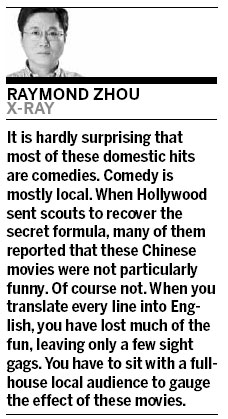 |
|
Scenes from Chinese films (clockwise from top right): Finding Mr Right, Painted Skin: The Resurrection, Lost in Thailand, Love Is Not Blind, Tiny Times, Switch and So Young. Photos Provided to China Daily
|
In the past year, Chinese films have galloped ahead like a dark horse, beating Hollywood imports.

There is a groundswell in China's film industry, and Hollywood has taken notice more than most Chinese have. In the first half of this year, box-office takings in the Chinese mainland reached 10.99 billion yuan ($1.8 billion; 1.35 billion euros), out of which domestic films accounted for 62 percent. For the first time in five years, takings for imported movies dropped in the world's second-largest market for film exhibition, and the fall was as much as 21.4 percent year-on-year.
Four Chinese movies grossed more than 500 million yuan at the box office in the first six months of the year. By contrast, only one import achieved this feat, and that was Iron Man 3, a Hollywood franchise movie with significant Chinese investment and a token nod to Chinese input in the form of two cameo appearances by Chinese stars.
Hollywood has always accused its Chinese peers of manipulating the market. But this time there was no "protection month" in which only Chinese works were allowed to screen; and imports were not deliberately scheduled to compete with each other. Almost miraculously, a sizeable audience for home-made movies instead of imported ones seemed to pop up from nowhere. That took both domestic pundits and Hollywood honchos by surprise.
Hollywood had always commanded close to half of China's film market. That was when China limited the number of imports to just 20 a year. When China raised the import quota from 20 to 34 early last year, it spelled doom for the domestic industry. And it was indeed doomsday for the first batch of Chinese movies that unfortunately debuted in the 2012 spring season. All of them flopped miserably.
A protection month was hastily installed. Painted Skin: The Resurrection, whose distributor had reportedly pleaded for a three-day window, suddenly found itself with no competition and ended up grossing 726 million yuan. If that was a fluke, Lost in Thailand won the race without such measures by the end of the year when it became the highest grossing Chinese movie with 1.25 billion yuan and the most attended movie ever since film exhibition as a means of entertainment nosedived in the late 1980s and early 1990s.
We recommend:
